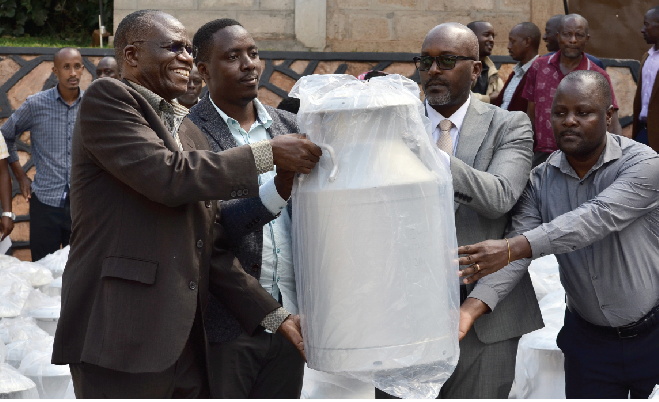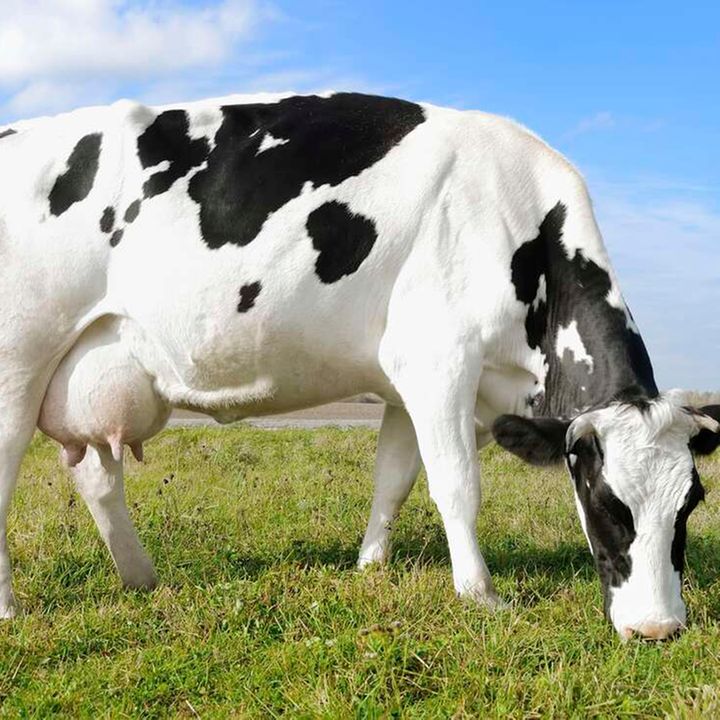Experts calls for more processed milk for vibrant dairy farming

Farmers from Kiboga receive milk cans during a ceremony at Heifer International on Monday. DDA’s Samson Akankiza Mpiira, (second right) and Heifer’s John Ssenyonga (right) handed over the equipment. Below, Silver Turyahikayo stresses the role of milk processors in improving quality. PHOTO/GEORGE KATONGOLE
What you need to know:
- Dairy production across Uganda is dominated by small-scale farmers living in impoverished rural areas.
- Strategic support for the sector will help to improve milk quality and reduce seasonal variability in milk production.
The Dairy Development Authority (DDA) says more attention needs to be paid to the processing opportunities if the market is to grow exponentially.
Speaking at the event to distribute dairy production equipment to farmers at the headquarters of Heifer International this week, Samson Akankiza Mpiira, the head of technical services at DDA stresses that Uganda’s milk processing needs to be upgraded.
According to statistics, 33 percent of the marketed milk in Uganda is processed, while 67 percent is sold as raw milk. By December 2021, annual milk production in the country had risen to 2.8 billion litres. Akankiza explains that milk processing allows the preservation of milk and helps reduce food-borne illness.
“All healthy cows produce healthy milk. It only gets contaminated at the handling stage right from milking to handling,” Akankiza says. He adds that although many rural farmers carry milk in plastic jerry cans, it is unhygienic and causes significant post-harvest losses. “There are some areas in a jerry can that can be very difficult to clean creating health risks to consumers,” he says.
Farmers explain that jerry cans are cheap compared to the cans. A 20-litre jerry can goes for between Shs6,000 and Shs8,000 while a 50-litre milk can goes for about Shs500,000. Akankiza points out that Uganda’s milk is facing hurdles in neighbouring countries because they claim it is of poor quality. He explains that the best option is to offer milk to processors. “But processors need high quality milk in order for farmers to reap properly,” he says. But with a low per capita consumption, Akankiza adds that domestic consumption needs to be increased by producing a variety of products to meet market demands.
Akankiza explains that DDA is pushing for the industrialisation of the sub-sector in order to boost dairy processing to 2.5 billion litres per day. Currently, there are 483 milk collection centres countrywide with a total installed capacity of 1,938,522 litres. These centres are operated by dairy cooperatives, private individuals, companies, and processors. Milk processing is one of the fastest growing sub-sectors with 135 licensed companies processing with a capacity of 2.8 million litres per day.
Building resilience
The dairy sector is currently growing at an average rate of eight percent per annum mainly due to the strategic interventions of government and development partners. In order to increase the productivity of the dairy sector, several players have embarked on efforts to create a quality final product.
Heifer International is implementing a three-year dairy value chain project codenamed Accelerate Dairy Production and Productivity (ADAP) targeting 3500 smallholder dairy farmers in Kayunga, Kiboga, Kyankwanzi, Mityana, Nakaseke, Nakasongola and Wakiso districts ADAP targets smallholder farmers to produce larger quantities of higher quality milk through better access to farm inputs, extension services, breeding services, feed and fodder, skills, and knowledge on husbandry practices, and adopting technology.
This is aimed at increasing capacity utilisation of the milk processor installed capacity by 42 percent by end of project. Heifer International gave out 500 aluminum milk cans to more than 20 cooperatives and 29 pulverizers in a bid to improve milk quality.
“With the increasing climate change there is need to adopt production enhancement and quality management practices to maximise revenue in dairy,” says John Ssenyonga, the director of programmes at Heifer International. Ssenyonga explains that Heifer International is supporting dairy farmer cooperatives by setting up a revolving fund to enable the farmers access quality and affordable milk cans.
The cooperatives will sell the cans to their members at a favourable price to enable them to obtain more milking cans.
Partnerships
In partnership with aBi Development and Jesa, the project is aimed at building the capacity of farmers to improve milk quality. Jesa Dairies guarantees a reliable and profitable market for milk by supporting farmer organisations with cooling units (coolers).
“We expect the fund to grow further and reach other dairy farmers,” says John Ssenyonga.




